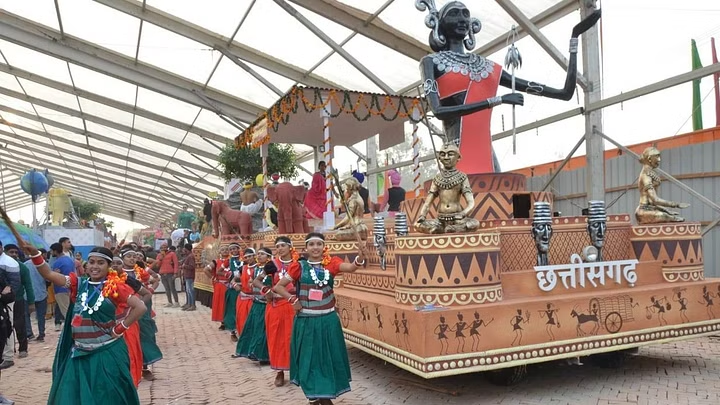Chhattisgarh Switch to Hindi
Chhattisgarh Republic Day Tableau
Why in News?
Chhattisgarh's 'Bastar Ki Adim Jan Sansad: Muria Darbar' tableau was displayed at the National Theatre in New Delhi on 22 January, ahead of the Republic Day parade on 26 January.
Key Points
- The tableau was praised for showcasing the tribal society's democratic consciousness since primitive times.
- Chhattisgarh Chief Minister praised the team responsible for creating the tableau, stating that the theme was important for tribal society and will acquaint the world with their democratic traditions.
- The 'Bastar Ki Adim Jan Sansad: Muria Darbar' tableau that will be a part of the Republic Day parade at New Delhi's Kartavya Path, features Muria-Darbar and Limau-Raja, part of the Bastar-Dussehra tradition from Jagdalpur.
- It features terracotta crafts, symbolising people's power, and showcases the cultural development in Bastar.
- It also showcases the 600-year-old tribal tradition of community decision-making in Bastar, a district in Chhattisgarh.
Muria-Darbar
- The Muria Darbar in Bastar was started on March 8, 1876, in which the Deputy Commissioner of Sironcha, Make George, addressed the Manjhi-Chalkis.
- Later, according to the convenience of the people, it was made an integral part of Bastar Dussehra, which continued for 145 years as per tradition.
Limau Raja
- It is the natural stone throne symbolizing Bastar's democratic roots and is situated within Bade Dongar,Gadirao Dongri.
- In ancient times, when the region lacked a ruling monarch, the community would gather around this stone "throne" to deliberate on important matters.
- A ritual unfolded where a lemon, placed atop the symbolic throne, became the focal point of decision-making.








%20MPPCS%202025%20Desktop%20E.jpg)
%20MPPCS%202025%20Mobile%20E%20(1).jpg)










.png)
.png)











 PCS Parikshan
PCS Parikshan


